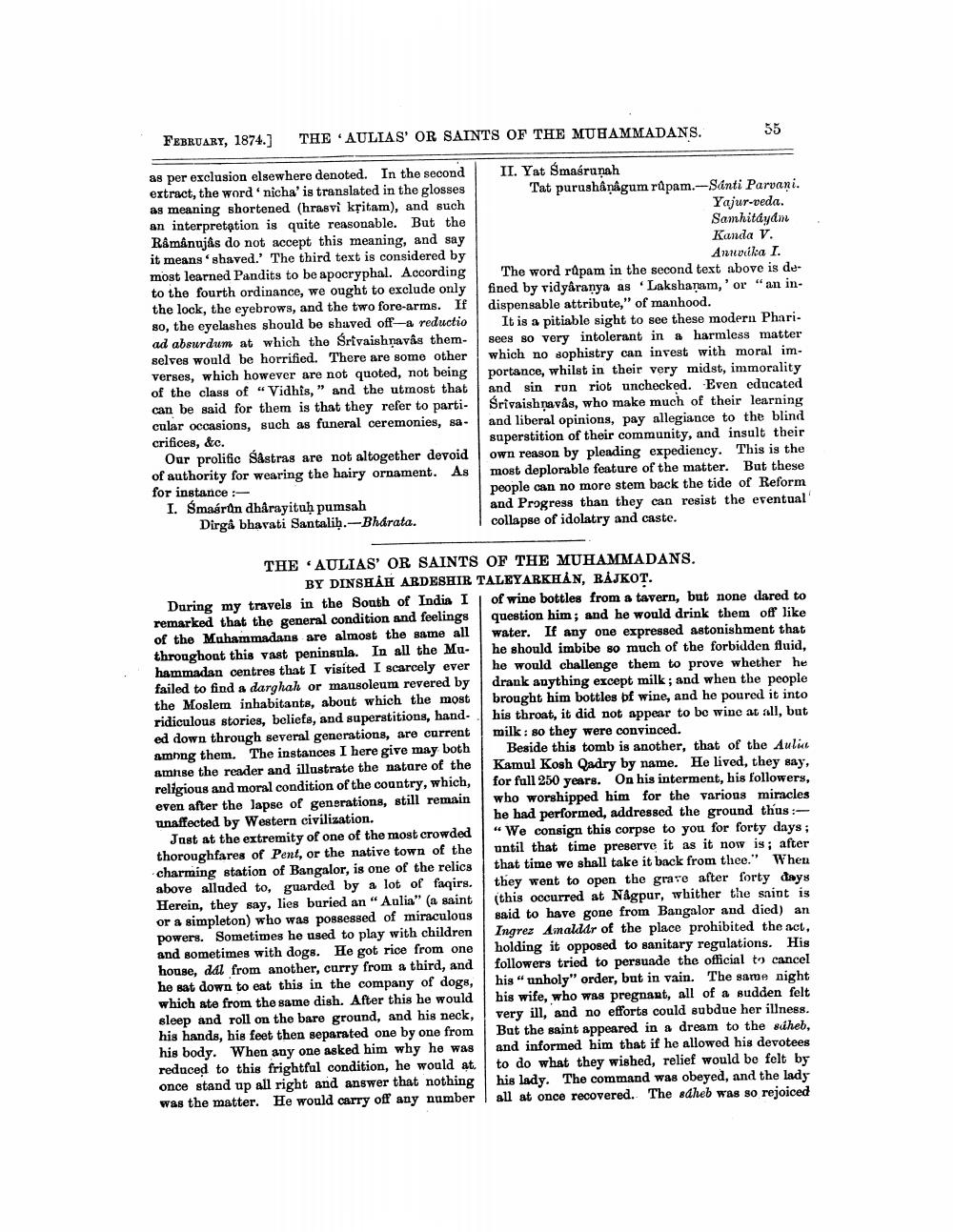________________
FEBRUARY, 1874.] THE AULIAS' OR SAINTS OF THE MUHAMMADANS.
II. Yat Smaśrunah
as per exclusion elsewhere denoted. In the second extract, the word ' nicha' is translated in the glosses as meaning shortened (hrasvi kritam), and such an interpretation is quite reasonable. But the Râmânujâs do not accept this meaning, and say it means 'shaved.' The third text is considered by most learned Pandits to be apocryphal. According to the fourth ordinance, we ought to exclude only the lock, the eyebrows, and the two fore-arms. If so, the eyelashes should be shaved off-a reductio ad absurdum at which the Śrivaishnavâs themselves would be horrified. There are some other verses, which however are not quoted, not being of the class of "Vidhis," and the utmost that can be said for them is that they refer to particular occasions, such as funeral ceremonies, sacrifices, &c.
Our prolific Śâstras are not altogether devoid of authority for wearing the hairy ornament. As for instance :
I. Śmagrûn dharayituḥ pumsah
Dirga bhavati Santaliḥ.-Bharata.
During my travels in the South of India I remarked that the general condition and feelings of the Muhammadans are almost the same all throughout this vast peninsula. In all the Muhammadan centres that I visited I scarcely ever failed to find a darghah or mausoleum revered by the Moslem inhabitants, about which the most ridiculous stories, beliefs, and superstitions, handed down through several generations, are current among them. The instances I here give may both amnse the reader and illustrate the nature of the religious and moral condition of the country, which, even after the lapse of generations, still remain unaffected by Western civilization.
THE AULIAS' OR SAINTS OF THE MUHAMMADANS. BY DINSHAH ARDESHIR TALEYARKHAN, RAJKOT.
Just at the extremity of one of the most crowded thoroughfares of Pent, or the native town of the charming station of Bangalor, is one of the relics above alluded to, guarded by a lot of faqirs. Herein, they say, lies buried an "Aulia" (a saint or a simpleton) who was possessed of miraculous powers. Sometimes he used to play with children and sometimes with dogs. He got rice from one house, dal from another, curry from a third, and he sat down to eat this in the company of dogs, which ate from the same dish. After this he would sleep and roll on the bare ground, and his neck, his hands, his feet then separated one by one from his body. When any one asked him why he was reduced to this frightful condition, he would at. once stand up all right and answer that nothing was the matter. He would carry off any number
55
Tat purushânâgum rûpam.-Sánti Parvani.
Yajur-veda. Samhitayam
Kanda V. Anuvika I.
The word rûpam in the second text above is defined by vidyâranya as Lakshanam,' or "an indispensable attribute," of manhood.
It is a pitiable sight to see these modern Pharisees so very intolerant in a harmless matter which no sophistry can invest with moral importance, whilst in their very midst, immorality and sin run riot unchecked. Even educated Śrivaishnavâs, who make much of their learning and liberal opinions, pay allegiance to the blind superstition of their community, and insult their own reason by pleading expediency. This is the most deplorable feature of the matter. But these people can no more stem back the tide of Reform and Progress than they can resist the eventual collapse of idolatry and caste.
of wine bottles from a tavern, but none dared to question him; and he would drink them off like water. If any one expressed astonishment that he should imbibe so much of the forbidden fluid, he would challenge them to prove whether he drank anything except milk; and when the people brought him bottles of wine, and he poured it into his throat, it did not appear to be wine at all, but milk: so they were convinced.
Beside this tomb is another, that of the Aulia Kamul Kosh Qadry by name. He lived, they say, for full 250 years. On his interment, his followers, who worshipped him for the various miracles he had performed, addressed the ground thus:"We consign this corpse to you for forty days; until that time preserve it as it now is; after that time we shall take it back from thee." When they went to open the grave after forty days (this occurred at Nagpur, whither the saint is said to have gone from Bangalor and died) an Ingrez Amaldar of the place prohibited the act, holding it opposed to sanitary regulations. His followers tried to persuade the official to cancel his "unholy" order, but in vain. The same night his wife, who was pregnant, all of a sudden felt very ill, and no efforts could subdue her illness. But the saint appeared in a dream to the saheb, and informed him that if he allowed his devotees to do what they wished, relief would be felt by his lady. The command was obeyed, and the lady all at once recovered. The saheb was so rejoiced




